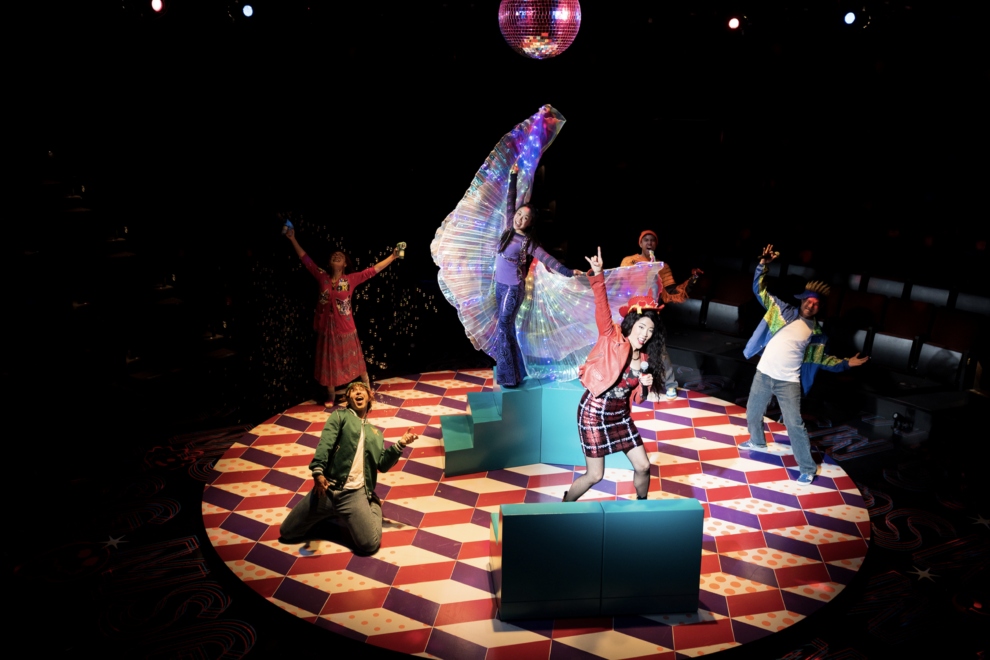I laughed so hard that my mouth was left gaping while line after line of humor slid down my throat and festered in my stomach, churning out an expletive under my breath as I choked on the reality that the comedy of this play was deeply funny because it was deeply truthful.
Truthful about my own insecurities. Truthful about the ways I sometimes want to disappear into a quiet, cold, empty place. Truthful about the generational hurt that therapy can only make ripple on top of the coursing undercurrents of anger, disassociation, confusion and rejection. And the minute a bubble pops on the surface, another lurking drop fills the well.
Ricocheting between joy and sadness, present and past, hope and loss, I was propelled through an hour and 40 minutes of storytelling that made me feel known, represented and heard.
“Exotic Deadly: Or the MSG Play” made its world premiere on April 13 at the Old Globe. Written by Keiko Green and directed by Jesca Prudencio, this play explores the weaponization of Asian cuisine, specifically the spice MSG, to advance racist agendas meant to degrade the dignity of AAPI people. The main character realizes her family helped create MSG and she must wrestle with identity, discrimination and false science publications.
Through the lens of a 14 year old girl (Ami), we see what it means to live in a community where your identity is something to be ashamed of. Your food is something to hide. And your family is something to shy away from. And yet, these extremely difficult and serious experiences are layered with moments of humor that remind you that even with all this hurt, there is so much to laugh about.
Through the eyes of Ami, we see the ways in which discrimination, fear, un-based claims and fake science erode the centrality of a seasoning meant to define food, not poison it. But more broadly, the MSG is a greater representation of the generational hurt that grandfathers, mothers and sons still carry and often avoid talking about. We opt out for silence and closeted emotions rather than spicing life up and sprinkling the truth of our experiences in our conversations.
I’m tempted to compare “Exotic Deadly: Or the MSG Play” to the academy award-winning movie, “Everything Everywhere All At Once.” The comparison is not coming from a place of competition where one has to triumph over the other but from sheer awe that this play and this film are in the same category — a category that is finally recognizing AAPI people’s stories that are emotionally complex and expressive.
The time has finally come where we recognize the model minority myth is in fact a myth. The complexity of our experiences with racism and discrimination has led us to put up walls of academic excellence and school involvement, but we are not perfect. Ami is not afraid to recognize that truth. In fact, we are deeply flawed because of a tumultuous history that has eroded our ability to connect with our tiger moms, feel confident in our intelligence and take ownership of our complex and delicious cuisines.
Not only that, the creatives producing the art — the directors and designers — are also ensuring that AAPI talent is taking the spotlight in places where they’ve historically been typecast as the “exotic” beauty or the foreign villain.
However, while AAPI folk share collective hurt, our stories are not all the same. American-Japanese citizens endured imprisonment that was phrased as the more palatable word “internment.” American-Chinese citizens were used for their manual labor in the growth of the railroad. Some found economic opportunity while also experiencing hostility, violence, and legal exclusion. Filipino-American citizens were exploited for manual farm labor with miniscule wages and promises of violence if they dissented. These broken bodies were all caught in the same system, but the generational hurt stemmed from different forces that worked a capitalistic machine of exploitation and hurt.
While this story focused on the experiences of a Japanese-American teen, the messages and experiences being displayed are universal among AAPI communities because plays like “Exotic Deadly: Or the MSG Play” and films like “Everything Everywhere All at Once” intimately know what it is like to carry emotional baggage. Yet they find a way to use universal symbols such as food to convey the immense weight.
The ways the actors interacted with the audience at times encouraged us to confront our internalized racism or biases and at other times made us want to join in with the dancing or singing. Their knack at being able to do both of those things and stand in the in-between space of those very different experiences was astounding.
The details of the costuming, lighting and music all complemented the challenges the individual characters faced. Whether it was Ami’s or MSG’s evolution in fashion, or moments when Ami broke the third wall to tell the lighting designer to change the lights, these little details impacted the atmosphere the audience was present in.
We all stood as they took their bows on the stage. When Actor 3 (Trevor Salter) came onstage, clapping hands waved frantically in front of my face trying to convey what I can’t begin to describe except as enamored gratitude. He looked at me when he bowed and offered this gleaming smile — one that showed he was proud of who he was and the work he had done. In fact, it was a smile of such confidence it made me blush. I was shocked when he signed “I love you” to me. That’s when I realized this smile was not for me. The “I love you” was also not for me. The two frantic-waving people in front of me, I assume, were his parents. The smile was for them, not for me. The pinay mother leaned forward in anticipation, looking proud. The father glinted with a hint of tears, probably not shed but expressed in proud applause.
To love, to hurt, to tear up, to feel, to eat different-smelling food is what it means to be an AAPI person. We are who we are because of the people, the seasoning, the food, the culture, that came before us. And nothing, not even racism, discrimination, hate nor imprisonment can take that away from us. Our ancestors look at us, see us and share with us the importance of what it means to be seen and held. And it’s high-time this category that “Exotic Deadly: Or the MSG Play” and “Everything, Everywhere All At Once” are pioneering hits mainstream viewers with the truth that AAPI experiences deserve to be displayed on film and in theater as glorious art.
To see “Exotic Deadly: Or the MSG Play” as an AAPI person is to take ownership of the seasoning, the food, the culture and the ancestors that came before us. To see it as a supporter of the arts is an opportunity to learn about the history and culture of another community and pause to ask, “What are the ways our country has othered people? What are the ways we can stop that narrative?”
Previews of “Exotic Deadly: Or the MSG Play” ran April 8 through April 12. Opening night was April 13, and the play will run through May 7. Tickets are available for purchase online https://www.theoldglobe.org/pdp/23-season/exotic-deadly-or-the-msg-play/#?startDate=2023-04-01&%3FendDate=2023-04-30








